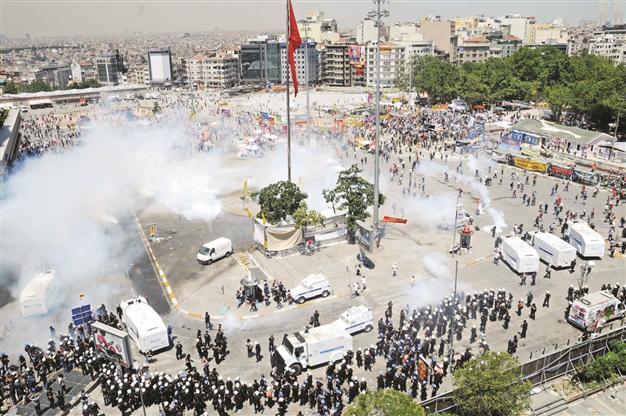Turkey charges 255 over mass Gezi Park protests
ISTANBUL - Anadolu Agency

The Gezi Park protests began at the end of May against a government redevelopment plan. The attempt to save the last green area in Istanbul’s central Taksim Square evolved into the country’s largest turmoil in recent history.
Turkish prosecutors have charged 255 protesters, including seven foreigners, over the mass demonstrations that swept the country in June.Those indicted face a range of charges including violating laws on demonstrations, “damaging public property,” “taking part in illegal demonstrations,” “causing interruptions in public services,” “damaging a place of worship,” and “protecting criminals.”
According to a statement released by the Istanbul Public Prosecutor’s Office yesterday, 308 people were indicted, while 36 investigations are still continuing based on accusations of “belonging to a terrorist group” and “attempting to prevent the Turkish government from doing its duty,” under Article 10 of the Anti-Terror Law.
The majority of those indicted, who face one or several of those accusations, will be tried by the 55th Criminal Court of First Instance. The Prosecutor’s Office said accusations against 10 suspects had been dropped due to the lack of evidence.
Investigations will be continued for unidentified suspects on similar allegations, in line with complaints from 249 people. The nationalities of the foreigners who have been charged is currently not known. The Prosecutor’s Office has assigned law enforcement units to identify those suspects.
The Gezi Park protests in Turkey began at the end of May against a government redevelopment plan. The attempt to save the last green area in Istanbul’s central Taksim Square evolved into the country’s largest turmoil in recent history, with prolonged protests across the country, resulting in the deaths of five protesters and one police officer, and thousands of injured.
Mosque claims in indictment
The indictment’s reference to the damaging of a place of worship refers to the row over a mosque in Istanbul, which was used as a shelter during a harsh police crackdown in June.
Many protesters, fleeing tear gas canisters and rubber bullets fired at close range by police, took refuge in the Dolmabahçe Bezm-i Alem Valide Sultan Mosque on the banks of the Bosphorus, near the Ottoman palace that Erdoğan uses as his office in the city.
Erdoğan accused the demonstrators of entering the mosque armed with beer bottles, claims that were later denied by the mosque’s imam, Fuat Yıldırım.
Yıldırım was subsequently discharged from his post at the mosque in September and appointed to a mosque in Kayabaşı, a remote village northwest of Istanbul.
Erdoğan also claimed to be in possession of a video showing protesters drinking in the mosque, but the existence of the video has not been verified.
















